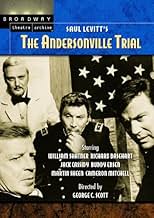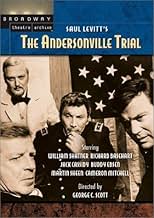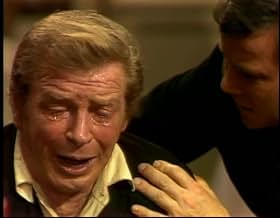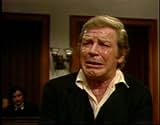A dramatization of the 1865 war-crimes trial of Henry Wirz, commandant of the notorious Confederate POW camp at Andersonville, Georgia.A dramatization of the 1865 war-crimes trial of Henry Wirz, commandant of the notorious Confederate POW camp at Andersonville, Georgia.A dramatization of the 1865 war-crimes trial of Henry Wirz, commandant of the notorious Confederate POW camp at Andersonville, Georgia.
- Won 3 Primetime Emmys
- 4 wins & 2 nominations total
Dal McKennon
- First Guard
- (as Dallas McKennon)
William Bryant
- The Lieutenant
- (as Bill Bryant)
- Director
- Writer
- All cast & crew
- Production, box office & more at IMDbPro
Featured reviews
I only wish they would put this film out on video because it is one that truly deserves to be called a classic. Forget The Caine Mutiny and A Few Good Men. This is the best and most riveting courtroom thriller ever made. I always thought of William Shatner as a blowhard who couldn't act his way out of a paper bag, but here maybe for the only time, he gives an excellent performance as the prosecutor with a heart determined to bring this man to justice. Andersonville really was a hell on earth and the descriptions of it they give here will give you chills. The best scene is the one where Shatner cross examines Richard Basehart and keeps asking him why he didn't disobey orders if it could have saved so many innocent lives. What gets me is that Basehart's character (Captain Wirz) keeps insisting that he was only obeying orders. This is the same excuse that the Nazis and the Nuremberg War Crimes Trials used. You keep wondering if this man really has no soul. George C. Scott played the prosecutor in the Broadway version and does a wonderful job of directing it. This was made at about the same time that he made Patton I believe. This is a great film with a first rate cast. I only wish it could be seen more often.
I watched this on TV when I was 13 or 14 yrs old and was engrossed in it. It left a lasting impression on me. Even to this day, I still think about it. As a kid, I couldn't have told you if the acting was first rate. Evidently it was; I do remember thinking the actors presented it as if the story had happened to them. I also remember being aware that William Shatner was remarkably restrained in this role and thinking how convincing he was.
I can't say this particular movie sparked my interest in American history, but it certainly looms large. Even if the story has been "Hollywood-ized" with the addition of bogus testimony of the camp commandant, the rest of the story is quite true. The sad story of Civil War POW's at Camp Sumter (the actual name of the prison) should be studied by all, not just students of American history. Incidentally, the Andersonville National Historic Site (outside of Richmond, VA) is the only national park that serves as a memorial for ALL American POW's. Because of having seen this movie, I sought out more info about the actual place and actual facts. This doesn't necessarily prove it's a well made movie, but it's the highest compliment I can pay to The Andersonville Trial.
To me, the time invested in watching this movie is worth it.
I can't say this particular movie sparked my interest in American history, but it certainly looms large. Even if the story has been "Hollywood-ized" with the addition of bogus testimony of the camp commandant, the rest of the story is quite true. The sad story of Civil War POW's at Camp Sumter (the actual name of the prison) should be studied by all, not just students of American history. Incidentally, the Andersonville National Historic Site (outside of Richmond, VA) is the only national park that serves as a memorial for ALL American POW's. Because of having seen this movie, I sought out more info about the actual place and actual facts. This doesn't necessarily prove it's a well made movie, but it's the highest compliment I can pay to The Andersonville Trial.
To me, the time invested in watching this movie is worth it.
One of the many pleasures of this compelling court martial drama, adapted from Saul Levitt's 1959 Broadway play, is seeing actors we associate from with lightweight TV shows doing something meatier.
Lt. Col. N.P Chipman (William Shatner) is the Army prosecutor, Otis Baker (Jack Cassidy) the defense attorney and Gen. Lew Wallace (Cameron Mitchell) the judge in the trial of Henry Wirz (Richard Basehart), the Confederate officer who ran a prisoner of war camp in Andersonville which saw 14,000 Union prisoners die from cruel neglect. Witnesses include Lt. Col. Chandler (Harry Townes), who was assigned to inspect the Andersonville prison; Dr. John C. Bates (Buddy Ebsen), the physician at the camp horrified by his experience; Ambrose Spencer (John Anderson), a plantation owner who can testify that food offered to the camp by nearby residents was refused; James Davidson (Michael Burns, whose liquid blue eyes are an asset to his performance), a haunted 19-year-old prisoner who claims a fellow was torn apart by dogs; Jasper Culver (Lou Frizell) another prisoner who has a story about a man named Chickamauga; Sgt. James Gray (Albert Salmi) who testifies that Wirtz killed a man with his own hands; and Dr. Ford (Whit Bissell), the one witness for the defense. Martin Sheen has a bit as a Union officer; Alan Hale Jr. (the Skipper on "Gilligan's Island") plays one of the court-martial board members, though he has no lines.
My favorite among the supporting cast is Buddy Ebsen, who as Jeb Clampett in "The Beverly Hillbillies" always gave the part far more than it seemed to deserve; here he gives his small role tremendous force with a low-key performance. I also enjoyed John Anderson, who I know from "Twilight Zone" episodes and his role as a used car salesman in "Psycho"; his performance here is typical but welcome.
Jack Cassidy has the same oily charm that serves him so well as a "Columbo" villain; but his character also has a strong sense of justice and credibly charges hypocrisy in his opponent. William Shatner, forever to be associated with "Star Trek," is not the perfect choice for a righteous crusader undergoing his own moral struggle: genuine sincerity always eludes him. But he still gives a richly textured performance and finally is successful in his role. The richest performance by far is from Richard Basehart as the German-accented Confederate officer who chose to follow orders from his military superiors while vetoing his own conscience. The parallels between him and Nazi war criminals is made clear; and Basehart brings out every subtlety to the man in a big, but not overdone or showy, manner.
George C. Scott, who had Shatner's role in the Broadway production, directs admirably well. The play is based on the transcript of the actual trial, with significant changes made for dramatic purposes; for one, Wirz did not testify on his own behalf, as he does here. This is highly recommended to anyone looking for a weighty drama, or a fascinating glimpse at American history.
Lt. Col. N.P Chipman (William Shatner) is the Army prosecutor, Otis Baker (Jack Cassidy) the defense attorney and Gen. Lew Wallace (Cameron Mitchell) the judge in the trial of Henry Wirz (Richard Basehart), the Confederate officer who ran a prisoner of war camp in Andersonville which saw 14,000 Union prisoners die from cruel neglect. Witnesses include Lt. Col. Chandler (Harry Townes), who was assigned to inspect the Andersonville prison; Dr. John C. Bates (Buddy Ebsen), the physician at the camp horrified by his experience; Ambrose Spencer (John Anderson), a plantation owner who can testify that food offered to the camp by nearby residents was refused; James Davidson (Michael Burns, whose liquid blue eyes are an asset to his performance), a haunted 19-year-old prisoner who claims a fellow was torn apart by dogs; Jasper Culver (Lou Frizell) another prisoner who has a story about a man named Chickamauga; Sgt. James Gray (Albert Salmi) who testifies that Wirtz killed a man with his own hands; and Dr. Ford (Whit Bissell), the one witness for the defense. Martin Sheen has a bit as a Union officer; Alan Hale Jr. (the Skipper on "Gilligan's Island") plays one of the court-martial board members, though he has no lines.
My favorite among the supporting cast is Buddy Ebsen, who as Jeb Clampett in "The Beverly Hillbillies" always gave the part far more than it seemed to deserve; here he gives his small role tremendous force with a low-key performance. I also enjoyed John Anderson, who I know from "Twilight Zone" episodes and his role as a used car salesman in "Psycho"; his performance here is typical but welcome.
Jack Cassidy has the same oily charm that serves him so well as a "Columbo" villain; but his character also has a strong sense of justice and credibly charges hypocrisy in his opponent. William Shatner, forever to be associated with "Star Trek," is not the perfect choice for a righteous crusader undergoing his own moral struggle: genuine sincerity always eludes him. But he still gives a richly textured performance and finally is successful in his role. The richest performance by far is from Richard Basehart as the German-accented Confederate officer who chose to follow orders from his military superiors while vetoing his own conscience. The parallels between him and Nazi war criminals is made clear; and Basehart brings out every subtlety to the man in a big, but not overdone or showy, manner.
George C. Scott, who had Shatner's role in the Broadway production, directs admirably well. The play is based on the transcript of the actual trial, with significant changes made for dramatic purposes; for one, Wirz did not testify on his own behalf, as he does here. This is highly recommended to anyone looking for a weighty drama, or a fascinating glimpse at American history.
10Pegapus
Back in 1998, I submitted the below review of The Andersonville Trial. Over the course of years, I searched for a video copy of the show, and finally paid a high price for it at eBay! Now, however, and finally, reason has triumphed, and this excellent presentation is available on DVD. I urge fans of this production to get DVDs of the show, and preserve its memory in your DVD library. As a top-notch and award winning drama, it is only when patrons support quality television like this that we can hope for even greater committments to such fare on the "boob tube." If we are prepared to support schlock on television and not shows like The Andersonville Trial, we will be left with nothing to preserve for TV generations to come.
This presentation is one of the most compelling dramas ever filmed for television. It was directed by George C. Scott, and includes great performances by such performers as Cameron Mitchell, William Shatner, Jack Cassidy, Albert Salmi and Richard Basehart.
It is the story of one of the few post Civil War trials, of the "commandant" of the POW camps at Andersonville. The conditions of the compound were horrible, and Henry Wirz (Richard Basehart)was charged after the war for terrible treatment of the prisoners.
Every performance in the presentation is excellent--it is great to see so many fine performers work together.
This presentation is one of the most compelling dramas ever filmed for television. It was directed by George C. Scott, and includes great performances by such performers as Cameron Mitchell, William Shatner, Jack Cassidy, Albert Salmi and Richard Basehart.
It is the story of one of the few post Civil War trials, of the "commandant" of the POW camps at Andersonville. The conditions of the compound were horrible, and Henry Wirz (Richard Basehart)was charged after the war for terrible treatment of the prisoners.
Every performance in the presentation is excellent--it is great to see so many fine performers work together.
As with many of you, it has been over thirty years since I have seen this on PBS. It stirred me then so much, I watched it again in close rerun cycle. I have often wished it was available on video, but never saw it, though it recently showed up at the head of someone's snarky list of Civil War themed movies. That got me thinking and sent me here, where I noticed many were still bemoaning the lack of a video. Well, Amazon.com lists it as having been released on video in 1991. Yay! That source does indicate both "out of stock" and "15 new or used copies available." You may have to actually place an order to find out which is true. Anyway, be of good cheer, comrades. It's out there somewhere!
I agree with all the positive comments, including those rating Shatner's performance as the prosecuting judge advocate. That he was directed by the man who debuted the role on Broadway was a sweet good fortune. I'd read an article in Playboy about George C. Scott around that same time, in which the author described being on the set with Scott coaching Shatner through a particularly dramatic scene, crouched down and gesturing with him, and both described as "baby bulls." I would love to have been a fly on the wall during some of the rehearsals and script sessions! Helluva show.
I agree with all the positive comments, including those rating Shatner's performance as the prosecuting judge advocate. That he was directed by the man who debuted the role on Broadway was a sweet good fortune. I'd read an article in Playboy about George C. Scott around that same time, in which the author described being on the set with Scott coaching Shatner through a particularly dramatic scene, crouched down and gesturing with him, and both described as "baby bulls." I would love to have been a fly on the wall during some of the rehearsals and script sessions! Helluva show.
Did you know
- TriviaAll of the witnesses as portrayed in the film are the actual witnesses who testified at Wirz's trial, and their dialogue in many cases is taken almost verbatim from the trial transcript. The major change from history is that Wirz did not testify and the whole "moral issue", around which this film revolves, was never raised at the trial.
- GoofsEarly on, a captain played by Martin Sheen comes into the court to tell Gen. Wallace that the defendant tried to hurt himself. The crossed sabers insignia of the cavalry on Sheen's cap is upside down.
- ConnectionsFeatured in The 23rd Annual Primetime Emmy Awards (1971)
Details
Contribute to this page
Suggest an edit or add missing content





































